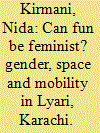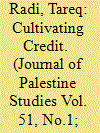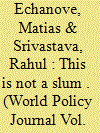| Srl | Item |
| 1 |
ID:
171303


|
|
|
|
|
| Summary/Abstract |
The densely populated, multi-ethnic area of Lyari in Karachi is one of the city’s original settlements. The area has become infamous as the site of an ongoing conflict between criminal gangs, political parties and law enforcement agencies for over a decade, and, for this reason, Lyari has been labelled as one of several ‘no-go areas’ in the city. However, for the residents of Lyari, the ways in which they understand their part of the city far exceed these facile labels. While at times their neighbourhoods do become fearful spaces, they are also places of comfort, familiarity and fun. This article explores the multiple ways in which women and girls experience and understand this area. In particular, it documents the various ways in which they express and experience enjoyment in their everyday lives and during exceptional moments. Based on extensive interviews and participant observation in several neighbourhoods, the research shifts attention away from solely using violence as a lens to understand urban space and away from seeing women mainly as victims of violence. Focusing on the pursuit of fun and enjoyment as an area of academic inquiry can be an important way to show how women push against and challenge patriarchal boundaries. By highlighting women’s and girls’ own creative navigations and engagements with their locality and the city, this paper brings new insights into discussions of gender and urban marginalisation more generally.
|
|
|
|
|
|
|
|
|
|
|
|
|
|
|
|
| 2 |
ID:
188227


|
|
|
|
|
| Summary/Abstract |
Since 2007, the Palestinian Authority has implemented a strategy of financialized urbanization in response to economic crises precipitated by Israel’s settler-colonial stranglehold on the Palestinian economy. This article argues that financialized urbanization operates as a mechanism to expand the local banking sector and as a modality of settler-colonial alienation. Examining the joint-ownership structures of companies whose activities straddle real estate and financial markets, the article shows where land ownership in the West Bank ultimately lies. The study highlights qualitative changes in money lending and the extended reach of finance to emphasize the risks of financial collapse. Understanding finance capital and settler colonialism as systems predicated on managing risk for maximum returns, the discussion draws their relation to each other into a single analytical framework to center the question of land dispossession and racialization at the heart of financialized urbanization.
|
|
|
|
|
|
|
|
|
|
|
|
|
|
|
|
| 3 |
ID:
145610


|
|
|
|
|
| Summary/Abstract |
Eight years ago, architects Matias Echanove and Rahul Srivastava set up their offices in Dharavi, a homegrown neighborhood in Mumbai. Instead of denigrating Dharavi as a “slum,” Echanove and Srivastava celebrate its vitality and adaptability. They point to the lessons that other cities can learn from Dharavi and demonstrate how “family and community networks can be the foundations” of an urban area.
|
|
|
|
|
|
|
|
|
|
|
|
|
|
|
|